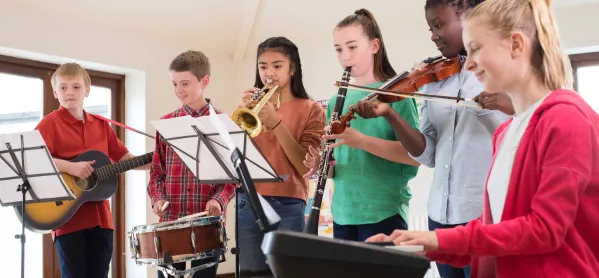The president of the EIS teaching union has hit out at the failure of the MSPs to force councils to end charging for music tuition, as the union’s annual general meeting gets underway today in Perth.
In her speech to the EIS AGM this afternoon, Alison Thornton - a secondary teacher - will describe the decision as “extremely disappointing”.
The consequence is, according to Ms Thornton, that many instrumental music instructors will continue to face “the challenge that uncertainty brings” every year when councils set their budgets.
The pay deal: New three-year pay deal agreed for teachers in Scotland
Background: ‘Music tuition should be free to all students’
Big read: Are we pulling the plug on music tuition?
Ms Thornton will say: “I would like to make particular mention reference to a group of EIS members who face the challenge that uncertainty brings and for many of them it happens on an annual basis.
“It was extremely disappointing that the recently published report from the education and skills committee did not make it a statutory requirement for local authorities to provide instrumental music tuition at no cost to all pupils who wished to learn a musical instrument. So, charging fees will continue to be seen as a revenue-raising option by local authorities and then when uptake falls jobs are put at risk.”
This year Ms Thornton was among those who protested against the Midlothian Council proposal to axe instrumental music tuition.
She added: “The proposal did not go ahead this year but there is no guarantee for future years and for our instrumental music tuition colleagues in other authorities also.”
Campaigners told the Scottish Parliament’s Education and Skills Committee inquiry into music tuition in schools that, “along with buses and breakfast clubs”, music tuition was always vulnerable to cuts. However, while the committee stated in its inquiry report that it believed in the principle that music tuition should be free, it also said it was “the democratic right of local authorities to take decisions about local expenditure”.
According to Ms Thornton, 2018-19 turned out to be “the year of the ballot”, with teachers finally agreeing a pay deal in April after 12 months of negotiations and threats of landmark strike action. College lecturers, meanwhile, have taken six days of strike action in order to secure a pay offer, which has now gone out to members with the recommendation to accept.
Ms Thornton will praise teachers for their part in securing the deal - which amounts to a total increase of 13.51 per cent over three years - with “huge numbers” voting every time there was a ballot and turning out for the march in Glasgow in October which she said was almost certainly “the largest ever demonstration held by a single trade union ever to take place in Scotland”.
“I have no doubt that this continued loud voice of our members was a crucial factor in the successful outcome of the pay campaign and the agreement signed at the SNCT (Scottish Negotiating Committee for Teachers) meeting at the end of April this year,” she said.
However, Ms Thornton will add that many issues still need to be addressed - many of which have remained much the same for decades - including workload, issues related to pupils with additional support needs, lack of access to professional development and lack of career-progression options.




